
Gregor Johann MendelOSA was a German-Czech biologist, meteorologist, mathematician, Augustinian friar and abbot of St. Thomas' Abbey in Brno (Brünn), Margraviate of Moravia. Mendel was born in a German-speaking family in the Silesian part of the Austrian Empire and gained posthumous recognition as the founder of the modern science of genetics. Though farmers had known for millennia that crossbreeding of animals and plants could favor certain desirable traits, Mendel's pea plant experiments conducted between 1856 and 1863 established many of the rules of heredity, now referred to as the laws of Mendelian inheritance.

Mendelian inheritance is a type of biological inheritance following the principles originally proposed by Gregor Mendel in 1865 and 1866, re-discovered in 1900 by Hugo de Vries and Carl Correns, and later popularized by William Bateson. These principles were initially controversial. When Mendel's theories were integrated with the Boveri–Sutton chromosome theory of inheritance by Thomas Hunt Morgan in 1915, they became the core of classical genetics. Ronald Fisher combined these ideas with the theory of natural selection in his 1930 book The Genetical Theory of Natural Selection, putting evolution onto a mathematical footing and forming the basis for population genetics within the modern evolutionary synthesis.
Mendel University in Brno is located in Brno, Czech Republic. It was founded on 24 July 1919 on the basis of the former Tábor Academy. It now consists of five faculties and one institute - the Faculty of AgriSciences, Faculty of Forestry and Wood Technology, Faculty of Business and Economics, Faculty of Horticulture, Faculty of Regional Development and International Studies and Institute of Lifelong Education. It is named since 1994 after Gregor Mendel, the botanist and "father of genetics", who was active in this city during his lifetime.
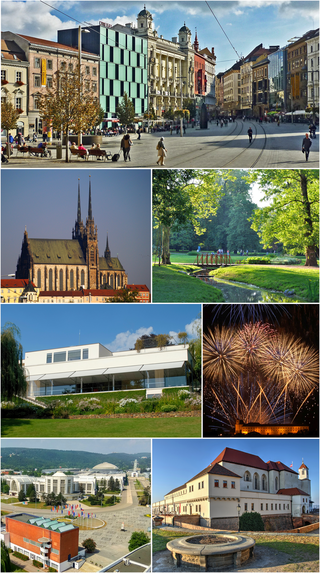
Brno is a city in the South Moravian Region of the Czech Republic. Located at the confluence of the Svitava and Svratka rivers, Brno has about 390,000 inhabitants, making it the second-largest city in the Czech Republic after the capital, Prague, and one of the 100 largest cities of the EU. The Brno metropolitan area has almost 700,000 inhabitants.
"Experiments on Plant Hybridization" is a seminal paper written in 1865 and published in 1866 by Gregor Mendel, an Augustinian friar considered to be the founder of modern genetics. The paper was the result after years spent studying genetic traits in Pisum sativum, the pea plant.

Masaryk University (MU) is the second largest university in the Czech Republic, a member of the Compostela Group and the Utrecht Network. Founded in 1919 in Brno as the second Czech university, it now consists of ten faculties and 35,115 students. It is named after Tomáš Garrigue Masaryk, the first president of an independent Czechoslovakia as well as the leader of the movement for a second Czech university.
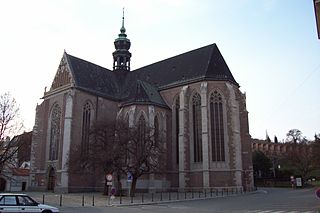
St Thomas's Abbey is an Augustinian abbey and church located in Brno in the Czech Republic. The geneticist and abbot Gregor Mendel was its most famous religious leader to date, who between 1856 and 1863 conducted his experiments on pea plants in the monastery garden. His experiments brought forth two generalizations which later became known as Mendel's Laws of Inheritance.

The snow pea is an edible-pod pea with flat pods and thin pod walls. It is eaten whole, with both the seeds and the pod, while still unripened.
The majority of church buildings in Brno belong to the Roman Catholic Church, others mainly to Protestant churches. In addition, there are a synagogue and a mosque. To describe the more notable ones, we can divide Brno into three areas: the city centre, the early suburbs, and former villages and large housing estates incorporated after World War I, including post-World War II developments.
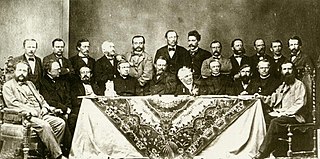
Aleksander Zawadzki born Józef Antoni Zawadzki was a Polish naturalist, author of flora and fauna lists of the Galicia region and the neighbourhood of Lviv. He was also the first scientist who studied and catalogued the beetles and butterflies of Eastern Galicia. He was responsible for encouraging Gregor Mendel to study genetics at Brno.

The Moravian Gallery in Brno is the second largest art museum in the Czech Republic, established in 1961 by merging of two older institutions. It is situated in five buildings: Pražák Palace, Governor's Palace, Museum of Applied Arts, Jurkovič House and Josef Hoffmann Museum. Since 1963 the gallery has organized the International Biennial of Graphic Design Brno.

The Central European Institute of Technology (CEITEC) is an educational institution in Brno, Czech Republic. It is a Research Center for Life Sciences, Advanced Materials and Nanotechnology. CEITEC was founded by a group of Brno universities and research institutes and supported by both the South Moravian Region and the city of Brno. Within CEITEC, a number of laboratories were built with instrumentation and facilities. CEITEC is member of EU-LIFE, an alliance of leading life sciences research centres in Europe.
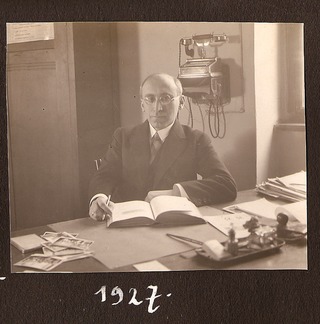
Hugo Iltis was a Czech-American biologist.
Classical genetics is the branch of genetics based solely on visible results of reproductive acts. It is the oldest discipline in the field of genetics, going back to the experiments on Mendelian inheritance by Gregor Mendel who made it possible to identify the basic mechanisms of heredity. Subsequently, these mechanisms have been studied and explained at the molecular level.
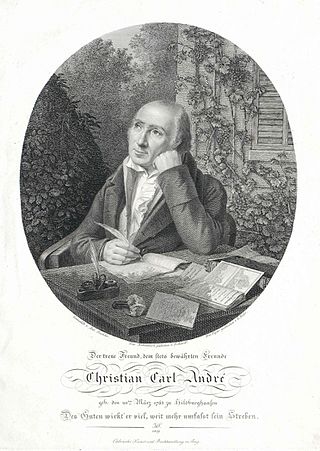
Christian Carl André (1763–1831) was a leading 19th century European natural scientist, publisher, economist and educator. He was among the pioneers in the study of heredity whose vision paved the way for the research of Gregor Mendel, the founder of modern genetics.
The Mendel Lectures is a series of lectures given by the world's top scientists in genetics, molecular biology, biochemistry, microbiology, medicine and related areas which has been held in the refectory of the Augustian Abbey of St. Thomas in Brno, Czech Republic since May 2003. The lectures were established to celebrate the 50th anniversary of the discovery of the structure of deoxyribonucleic acid (DNA) by James Watson (1928) and Francis Crick (1916-2004). The Mendel Lectures are named in honour of Gregor Johann Mendel (1822-1884), the founder of genetics, who lived and worked in the Augustinian Abbey in Brno 1843-1884. Based on his experiments conducted in the abbey between 1856 and 1863, Mendel established the basic rules of heredity, now referred to as the laws of Mendelian inheritance. The Mendel Lectures are organized by the Masaryk University, the Mendel Museum, and the St. Anne's University Hospital Brno. The twentieth season of the Mendel Lectures is running at present. More than 130 top scientists, including many Nobel Prize winners, have visited Brno to give a Mendel Lecture, for example Tim Hunt, Jack W. Szostak, John Gurdon, Elizabeth Blackburn, Paul Nurse, Venkatraman Ramakrishnan, Günter Blobel, Kurt Wüthrich, Jules A. Hoffmann, Aaron Ciechanover, Ada Yonath, Paul Modrich, Eric F. Wieschaus, Fraser Stoddart, Ben Feringa, Brian K. Kobilka and others.
Mendel Polar Station is a Czech research station in Antarctica on the coast of James Ross Island. It was founded by a Czech polar explorer Pavel Prošek. The official opening ceremony took place in February 2007 and made the Czech Republic the 26th country to have its own scientific base on the continent. The station is the property of Masaryk University in Brno and was named after the father of modern genetics, the meteorologist Gregor Johann Mendel. Thanks to the research carried out at the station, the Czech Republic is one of the countries who have a voting right in the Antarctic Treaty System.

The Basilica of the Assumption of Our Lady in Old Brno Abbey is a high Gothic, monumental convent temple. It was founded in 980-1020 by the unknown lord or monarch in Moravia. It was built on the site of an ancient sanctuary from the late 10th century in a short time in the years 1323 to 1334 at the instigation of Queen Elizabeth Richeza. It is the best preserved stylistically coherent and unified temple in Lands of Bohemian Crown.
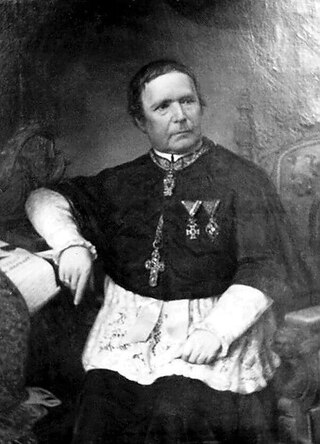
Cyril František Napp was an Austro-Czech abbot of the Augustinian order who took an interest in education and scholarship. He took an interest in horticulture and agriculture, and encouraged the work of Gregor Mendel who succeeded him at the Brno monastery of St Thomas as abbot.
















